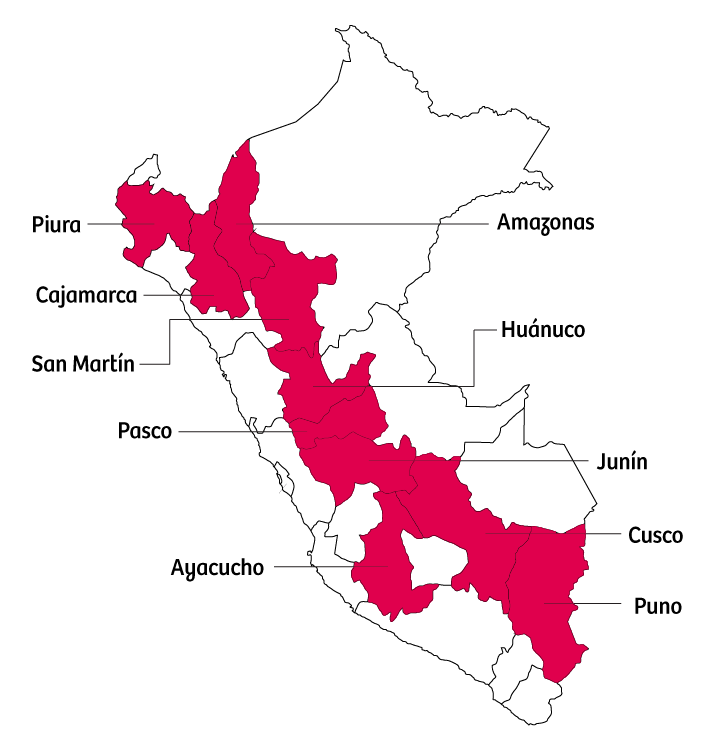Search by country:
SearchCoffee
Peru's finest in every cup

Peru's finest in every cup
Nestled in Peru’s valleys and mountains are some of the best coffee beans on the planet, where each cup is an unforgettable experience. On top of its exceptional flavor and peerless aroma, drinking coffee can help improve memory and attention span, slow aging and prevent diseases such as diabetes, Parkinson’s and Alzheimer’s. Three to five cups per day also increases life expectancy.
Coffee-growing regions
In Peru, there are 47 provinces, 13 regions and 10 departments with perfect conditions for growing excellent-quality coffee: a variety of climates and ecological zones. 87% of all Peruvian coffee is grown in the San Martín, Cajamarca, Junín, Amazonas and Cusco regions.

Today's growers use ancient ecological techniques that meet the standards of demanding markets like the United States, Europe and Asia.
This attracts buyers from all over the globe, drawn to Peru by its wide array of distinct flavors.
A premium export
Peru is the world’s seventh-largest coffee exporter and the second-largest organic coffee exporter. It boasts 425,416 hectares of coffee plantations, or 6% of its arable land, with the potential to grow coffee on another 2 million hectares.
Harvest times and product availability in the north and central region

Harvest times and product availability in the south and southeast region

Distinctions and certifications
Thanks to its fertile soils and rainy climate, Peru is the world's second-largest exporter of organic coffee. It has earned an international reputation as a supplier of premium coffees.
In 2010, Tunki Coffee was awarded the World’s Best Organic Coffee in a competition organized by the Specialty Coffee Association of America (SCAA) in the United States. Tunki outshone the best coffees from El Salvador, the United States, Guatemala, Kenya, Honduras, Nicaragua and Panama.
The exceptional quality of the coffee from the San Ignacio CASIL Coffee Cooperative, Cajamarca, earned it a gold medal from the German Coffee Roasters Federation.
And at the Third International Contest for Coffees Roasted in their Country of Origin (AVPA) – Paris 2017, beans cultivated in the regions of Puno (Sandia and Juliaca), Pasco (Villa Rica), Junín (Pichanaki, Mazamari, Pangoa), Amazonas (Rodríguez de Mendoza) and San Martín (Tarapoto) amassed 23 awards.
140,000 hectares of the land used to grow coffee in Peru is certified as organic, ensuring entry to international markets. This certification guarantees that the grower uses no chemicals or fertilizers, i.e. that they respect the environment. Demand for this 100% natural coffee is constantly on the rise, since people prefer healthy options for their diet. They also have a fair trade certification, which ensures that a certain markup on the coffee will go to social projects.
Back






